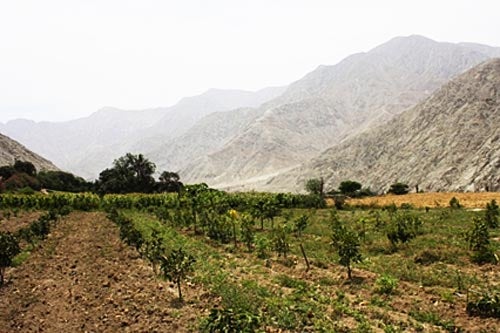
A five hours’ drive south of Lima lays the coastal provinces of Chincha. If one heads inland into the deserted mountains that are typical of costal Peru, one would be surprised to find agriculture blanketing the valley floor. For centuries local communities in these rugged terrains have been using water from small meandering streams to grow maize, and eke out a living by selling surpluses at nearby markets. However, in recent years the growth of industrial agriculture has squeezed these communities, making it hard for them to survive in these ancestral lands, forcing many of them to move to nearby cities such as Chincha Alta.
Several years ago the unpaved road that runs along this valley was rehabilitated by a project financed by the World Bank and Inter-American Development Bank, and implemented by the Government of Peru. On a recent visit, some of the local people we talked to indicated that while traffic had certainly increased after this improvement, and travel times had decreased, the price at which they sold their crops to middlemen had not changed.
Their story echoed a common reality throughout Peru in which middlemen captured a disproportionate amount of the benefits of improving the transportation infrastructure from the farmers who put in all the effort to produce the goods (perhaps because the prevalence of transportation monopolies). Farmers had no alternatives and accepted this as reality.
During project implementation a Development Window was set up to service this area. It first engaged with local governments to identify development priorities in the area (it helped that the manager of the Window used to be the mayor of a nearby district). It found that local conditions were well suited for the production of hass avocados, which could potentially be much more profitable than the maize that farmers were used to growing at the time (it also transports better and has a broad market).
However, growing avocados is a more sophisticated process that requires investments in greenhouses and several years of waiting before trees produce. The Window engaged with the local communities to inform them of this opportunity and eventually organized several associations of those willing to give this new crop a try. It then helped these associations develop business plans and convinced the district government to fund their initiative and brought in engineers to help with technical aspects and continued providing business assistance. Trees were quickly planted in the greenhouses and then they were successfully moved to the valley floor.
The trees had not produced avocados by the time the two year contract of the Window ended. However, because of their commendable work engaging with the broader society and aligning interests, the producer association quickly secured continuing funding from another NGO and from the district government (its mayor had run on a platform of supporting local producers). Presently, there are avocado greenhouses and plantations all over the region as several other governments (district, municipal and regional) have supported similar initiatives. At the time of writing, the first avocado trees planted were close to producing, and the farmer associations were eagerly waiting to commercialize these products themselves, skipping the middlemen, and raising enough capital to fund future crops.
In this example, the Development Window organized rural producers around a more profitable crop, gave them technical knowledge, and energized local governments to support them. While its work only lasted two years, it set a chain of events that is likely to benefit the local communities of these valleys for years to come.
Elaborated with the collaboration of Sebastian E. Guerrero, PhD Berkeley University.


Join the Conversation